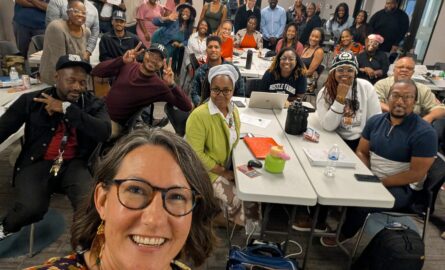In this episode of Friends of Project Healthcare…
Dr. Jessica Dudley, Chief Clinical Officer at Press Ganey, joined host Eric Thrailkill and Project Healthcare colleague Lauren Hatcher, to share insights on improving healthcare and addressing post-pandemic workforce challenges. With her extensive experience in healthcare leadership and data analysis, Jessica addresses the importance of collaboration, listening to the workforce, and leveraging technology to drive positive change.
“The goal of all of this is to get better,” Jessica shared. “It’s all about improvement because we all want great care for ourselves, for our family members. And as providers, we all want to make sure patients are getting great care.”
After a two-decade-long career at Brigham and Women’s Hospital in Boston where she served last as Vice President of Care Innovation, Jessica joined Press Ganey to lead their efforts to support organizations and increase clinician engagement.
“The biggest challenge in healthcare is to do what we know we need to do every time as we’ve intended to do it for every patient,” Jessica explained. “While we’re trying to make things better for our workforce, how do leaders, organizations and frontliners support each other so that they’re also having that kind of experience every day, every time?”
With a focus on physicians, Jessica hopes to improve leadership development for other organizations while addressing clinician burnout and advancing professional fulfillment.
“The ones who are doing better are really committed to those principles. They have leaders who walk the walk,” she claimed. “They hold themselves accountable to improving their performance.”
Jessica has the data to back that theory up.
Just like organizations collect financial performance metrics, they have metrics for improving the wellbeing and engagement of their workforce and patient experience. Press Ganey’s technology platform enables organizations to collect and analyze those key data points to identify areas for improvement, and support action plans.
By leveraging technology, organizations can then streamline processes, enhance communication, and drive positive change in healthcare delivery. “We’re bringing all of this data together, finding the insights, and then supporting organizations in acting on their data.”
Jessica emphasized the need for organizations to not just collect the right information at the right time but also recognize a need for improvement.
“The data can feel like a downer, but because organizations are starting to recognize we can’t be siloed, we’re seeing some real paradigm shifts,” she shared. “Organizations know that they can’t just survey and do nothing. You have to act, and we are seeing massive shifts in what people are doing. They are leveraging technology to better connect the data.”
One metric Jessica finds interesting is the relationship between workforce engagement and patient experience. By connecting dots between those data sets, organizations can identify areas for improvement and enhance the overall quality of care.
“What is the impact of lower levels of physician engagement or even alignment of physicians with senior leaders in the organization?” she offered. “What is the impact that’s having on patients that they’re seeing in their clinics?”
In a post-pandemic world, one common denominator that stands out in their analysis over the last few years is the importance of trust and leadership and the impact it had on the culture of care.
“You have to listen to what’s important to people,” Jessica said. “They want leadership to care, to actually recognize struggling and suffering…and are working to do something about it.”
Jessica recommends organizations go beyond traditional surveys and engage in ongoing conversations to understand the challenges and needs of their employees. By involving the workforce in decision-making and problem-solving, leaders can create a sense of ownership and improve overall engagement.
The hope is to identify and remove obstacles that stand in the way of hospital leadership and physicians, Jessica said, “so they can get back and do their jobs, why they went to medical school in the first place, to take care of patients.”
About Dr. Jessica Dudley Jessica is responsible for leading efforts to support organizations in increasing clinician engagement, workforce well-being, and improving patient care outcomes. Her areas of expertise include leadership development, clinical care redesign through outstanding teamwork, addressing clinician burnout, and advancing professional fulfillment. Prior to joining Press Ganey, Dr. Dudley was Chief Medical Officer at the Brigham and Women’s Physicians Organization. Dr. Dudley received her undergraduate degree from Yale University and her medical degree from Harvard Medical School. She is board-certified in internal medicine and is an assistant professor of medicine at Harvard Medical School.
Keep the Pulse, Friends!
LISTEN: “Follow” or “subscribe” to Friends of Project Healthcare on your favorite podcast platform.
REVIEW: Go to Apple Podcast at projecthealthcare.com/apple and leave a (hopefully) 5-star rating and creative review.
Friends of Project Healthcare Podcast
Brought to you by Nashville Entrepreneur Center



